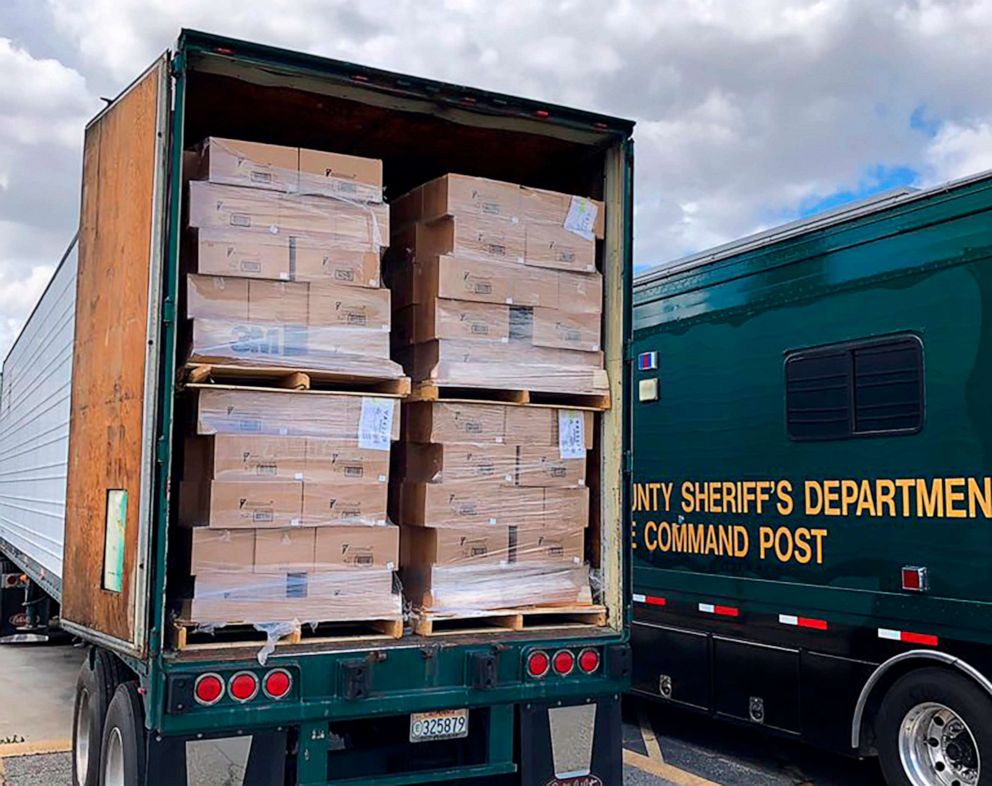Feds send supplies from stockpiles but some items are old or expired, officials say
“A mask is better than no mask,” one state official said.
While federal officials have touted the promise of tapping the national stockpile for providing desperately needed medical equipment, some states say the items they've received have surpassed their expiration dates.
The Federal Emergency Management Agency has started shipping much-needed respirators from the federal government’s emergency supply. New York City, for example, had requested 2.2 million of the specialized masks, known as N-95 respirators, from national stockpiles but has so far received 78,000. And many of the supplies have also expired, a New York City Health Department spokesperson said.
In Oregon, Gov. Kate Brown had originally requested 600,000 procedural masks and 400,000 of the N-95 respirators, as well as gowns, gloves, face shields and goggles. The state initially received about 10 percent of the requested supplies from the strategic national stockpile, with many items past their due date, officials there said.
"We are being told that while the equipment is capable of being used for COVID-19 response, what we are receiving is well past expiration dates and wouldn’t be suitable for surgical settings," Charles Boyle, Gov. Brown's press secretary, told ABC News.
The state has since received another batch of gear, Boyle said. It is not clear if any of those items were expired.
The Strategic National Stockpile is the nation's largest supply of potentially life-saving pharmaceuticals and medical supplies for use in a public health emergency severe enough to cause local supplies to run out, according to the website for Department of Health and Human Services, the government agency in charge of the stockpile. For national security purposes, the number of federal warehouses and their locations are kept a secret, but contents include pre-packed and transport-ready containers for delivery anywhere in the United States within 12 hours of a federal decision to deploy.
Local officials say the strategic national stockpile has not been replenished since the outbreak of the flu known as H1N1 in 2009, which may explain why some of the goods are expired.
Nate Wardle, a spokesman for the Pennsylvania Department of Health, said his state had discovered expired N95 masks in stockpiles that dated back to the H1N1 outbreak.
The expired masks have a failure rate of 5% to 10%, he noted, meaning they may not be able to maintain a tight fit and allow dangerous particles and droplets to enter. In some cases, the elastic band could disintegrate all together.
Still, the Centers for Disease Control and Prevention has advised health care officials that they should use of the masks because there is an urgent need.
"Some U.S. stockpiles include N-95 filtering facepiece respirators that have exceeded their manufacturer-designated shelf life," the CDC website says. "The respirators exceeding their manufacturer-designated shelf life are only being released due to the potential urgent demand caused by the COVID-19 public health emergency."

Wardle said Pennsylvania has not been able to determine whether expired masks were coming from the federal government or the state's own stockpile.
"We are advising all recipients of masks that the products they are receiving may have a failure rate," Wardle said. "If facilities report that they have received ones that are not working, we are working to send them additional masks as soon as we can."
But "a mask is better than no mask," he said.
Dr. Mark Abdelmalek, a medical contributor for ABC News, said the expired masks are no substitute for ones that provide proper coverage to health care workers.
"In these times of extremely limited supply, an expired mask that passes a visual inspection for defects is probably better than no mask at all. Ideally we can get masks to protect people on the front lines quickly," Abdelmalek said.
Andy Carter, the president and CEO of the Hospital & Health system Association of Pennsylvania, however, said he had heard reports that "some of the supplies" provided from the national stockpile were "not going to meet standards and will not be able to be used."
A nurse who works at a Washington, D.C., area hospital told ABC News, "Unless it's soiled or covered in sand dust, I'm not turning anything down. Anything is better than a bandana or scarf in these extraordinary times."
California has distributed masks past their expiration from the state stockpile as well, noting that officials had received permission from the CDC to use them, according to a press release from Gov. Gavin Newsom and the state’s health department.
"The way the masks have been stored will prevent the degradation of elastic that slips around the ears,” the release said, noting that was a key factor in the federal decision to allow their use. "These masks are approved for use only in limited, low-risk circumstances, thus relieving pressure on the supply chain of unexpired masks for health care providers caring for confirmed COVID-19 patients and other high-risk situations for infectious diseases."
Soorin Kim. contributed to this report.




